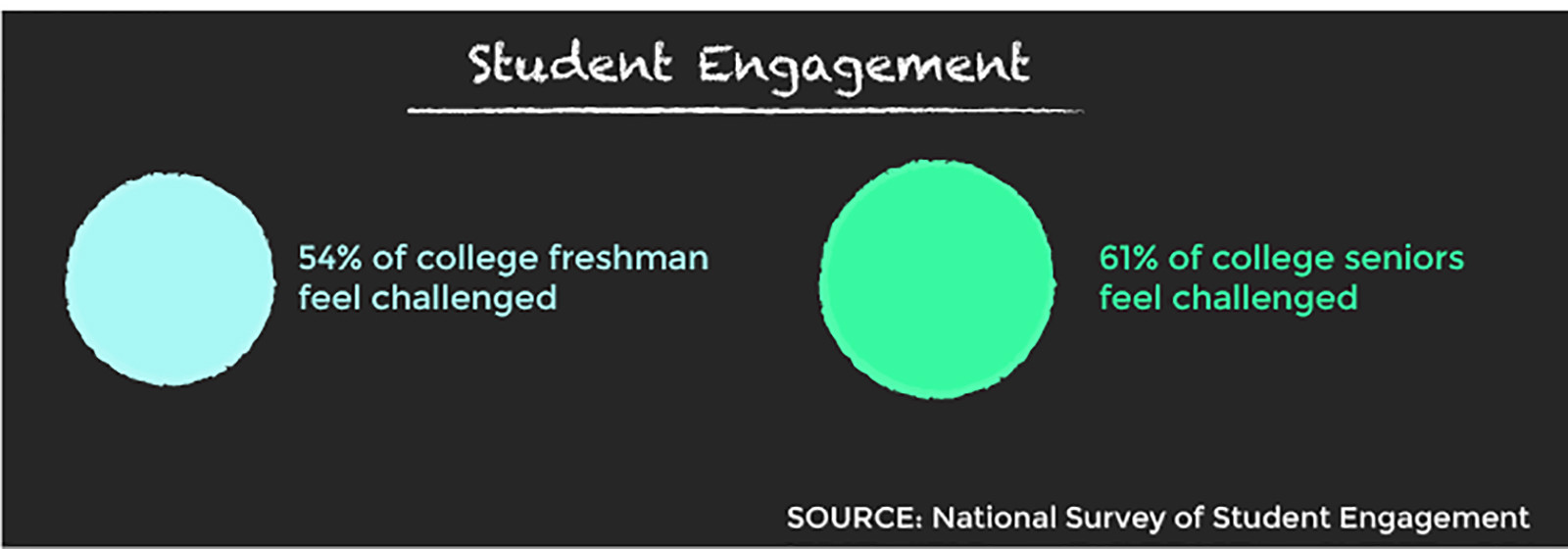
Over half of college students in the United States were reported to be insufficiently challenged by their courses despite increasing admissions selectivity, according to a report by the National Survey of Student Engagement, released Thursday.
Fifty-four percent of freshmen respondents reported they were being “highly challenged” by their schoolwork compared to 61 percent of seniors, according to the report titled Engagement Insights. The report gathered results from 315,000 first-year and senior students in 541 U.S. institutions in the Spring of 2015.
The report found a “modest negative relationship” on seniors’ course challenge, since participation in hands-on learning opportunities such as volunteer work, internships, faculty research and part time jobs prepared seniors better for graduate school and the labor market.
Alexander McCormick, the director of NSSE, said he finds the result of the survey to be cause for concern.
“We asked students questions about whether or not they’re being challenged to do their best work, not if the classes are difficult,” McCormick said. “We wanted to know if they’re being asked to put in their best effort [and] that’s why we observed students aren’t receiving an adequate challenge.”
In spite of the result, McCormick said, the majority of students surveyed reported being satisfied by their university education and indicated relevancy to their professional future. The NSSE reported that “66 percent of first year students frequently learn something that dramatically altered how they understand an issue or concept.”
The NSSE reported that students are turning to faculty members to prepare for their careers, as 80 percent of seniors look to their faculty for advice on their future profession.
The report also noted that the rise in financial stress since 2012, despite the strengthening economy, was particularly true for students from historically underserved communities and led to a decline in purchasing appropriate school materials.
In response to the report, BU spokesman Colin Riley said the high pressure students face is evidence opposing the report. The increasingly diverse range of talented students BU admits is an example of the university’s rigor, he said.
“Students, just from the amount of stress and the competitiveness that we hear about in undergraduate and graduate programs, are sufficiently challenged,” Riley said. “It may be different in different schools, but I certainly know we [at BU] hear all the time about students who are very high-achieving and for the first time they are not receiving the highest grade automatically.”
Several students said the result of the report does not reflect the academic rigor they experience at BU. Collins Yeates, a freshman in the Questrom School of Business, said despite working his best, getting the best result continues to be challenging.
“I went to a challenging high school that prepared me well for college,” Yeates said. “Basically as a whole, college is not easy. If you want to succeed, you have to work for it.”
Priest Gooding, a sophomore in the College of Arts and Sciences, said the report “is not true” for him, as he has experienced a few psychological and physical challenges to keep up with his courses.
“It is important that students are challenged, as challenges cultivate students into critical thinkers and problem solvers,” he said, “helping them develop an understanding of themselves.”
Tatiana Diaz-Gallegos, a sophomore in the College of Engineering, said she believed she has been challenged academically and personally at BU and disagreed with the report.
“It is imperative students feel challenged in college, because this it the time to learn, expand and try new things,” Diaz-Gallegos said. “If you aren’t challenged now, how will you grow as a person, figure out your true potential and what you really believe in?”
























































































































Making Change • Nov 23, 2015 at 11:04 am
“Over half of college students in the United States were reported to be insufficiently challenged by their courses ”
In the second paragraph you start with saying 54% say they are challenged. How is possible that more than half are not challenged?